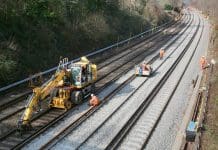The construction sector has warned big infrastructure projects could be at risk if EU workers are not allowed to remain in the UK post-Brexit
Groups representing Britain’s surveyors, architects, planners, and builders have written to Brexit Minister David Davis outlining concerns relating to skilled workers in the sector.
In the letter, the groups warn the industry would struggle to maintain big infrastructure and housebuilding projects if skilled EU builders are not allowed to remain in the country after the UK leaves the EU.
President of the Royal Institution of Chartered Surveyors Amanda Clack said: “We are in the grip of our worst construction skills crisis in almost 20 years.
“There is a real concern within our industry that if access to a skilled workforce is further restricted, Britain could stop building.
“My colleagues and I would urge government to keep this at the forefront of their minds when they come to negotiate our withdrawal from the EU.”
Among the signatories is the Royal Institute of British Architects, Chartered Institute of Building and Royal Town Planning Institute.
The skills shortage is not a new concern for the construction sector. The latest RICS survey found 56 per cent of its respondents were stifled by skills shortages. Bricklayers and quantity surveyors are in short supply.
Little insight has been offered by the government as to what controls will be in place in relation to immigration. The uncertainty is concerning for industries like construction, which relies heavily on migrant workers to fill skilled roles. In 2014 the National Institute of Economic and Social Research said more than 100,000 construction workers from the EU were working in the UK. In the capital more than half of all construction workers are from outside the UK. Without these skilled workers projects such as High Speed Rail 2 will struggle to come to fruition.
The Commons public accounts committee said: “The extensive programme of infrastructure investment over the next few years is increasing the demand for engineering, project management and commercial skills across the industry.
“The [transport] department and HS2 Ltd are competing with consulting and engineering firms and other government projects for scarce skills, which represents a key challenge that will also impact on project costs.”
The sector has called on ministers to focus on maintaining construction and infrastructure investment when the UK exits the EU.
“It is fundamental the government prioritises infrastructure and it remains at the forefront of maintaining a strong economy,” said Clack.

















Chickens come home to roost; the industry has been dangerously exposed to this skill shortage for many years and has done nothing to address it because it was more economical to import skills from abroad rather than solve it directly.
The positive in all this is that it should make our domestic skill-base stronger in the long run and end the erosion of wages in construction; that might be worth the short term pain.
Perhaps if construction companies trained our home grown young people. They would not need foreign labour.
John Brown
Past president
The Guild of Bricklayers